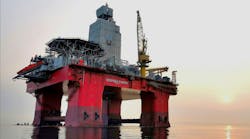The oil and gas industry has strong interests in the ugly controversy over plans to build a Muslim activities center two blocks from Ground Zero—the New York site of terrorist attacks on Sept. 11, 2001. Wishing that the furor would die on its own is, nevertheless, understandable.
Plans announced by Imam Feisal Abdul Rauf for a 13-story, $100 million facility in Lower Manhattan arouse passions, and passions inflame politics. Topping a long list of passions is the sensitivity of survivors of the 2,974 persons killed by the Muslim terrorists, most of whom were from Saudi Arabia. Close behind is the residual trauma of New Yorkers who witnessed mass murder in their city. And right behind that is the still-palpable pain of a proud nation subjected to surprise, violent attack.
These passions are real. To sweep them aside would be wrong. Like all passions, however, they have the dangerous power to distort. To let them distort relations among nations and peoples would be wrong, too.
Attack by Islam?
Yet exactly that is happening. Revulsion toward construction of the Muslim center and mosque flows from a festering belief that the 2001 tragedy represented an attack by Islam against the US. That view is wrong. It doesn't matter that the attackers were Muslim. It doesn't matter that they screamed religious slogans while committing their hellish deeds.
To the attackers, Islam was just a channel for uncontrolled hatred. They acted out of religious fanaticism that's neither acceptable to mainstream Islam nor peculiar to it. To the extent Americans fail to understand the true, twisted motives of the New York attacks, to the extent they blame all Muslims for atrocities committed by the terrorists of Al Qaeda, Al Qaeda wins.
Above all, Al Qaeda wants to impose a rigid version of Islam on Muslims and to isolate Islam from nonbelievers. Americans should not support its hateful mission by retreating into isolationism of its own. They should instead reassert the multiculturalism that defines their national character. They should, in the name of everything that makes their country exceptional, embrace Rauf's Cordoba Initiative and feel free otherwise to ignore it.
But the politics of division has hijacked the issue. President Barack Obama asserted religious liberty while discussing the project at an event related to the Muslim holy month of Ramadan. Opportunistic Republicans lunged at the chance to besiege him in an unpopular stance. They looked every bit as xenophobic and mean-spirited as Democrats routinely portray them.
The oil and gas industry should not follow Republicans into this muck. It has other, more serious issues with Obama. It should be addressing his overreaction to the Gulf of Mexico oil spill, his persistent threat to tax oil and gas into oblivion, his blind spending on uneconomic energy, his penchant for overregulation, and his liberal economic and environmental agenda. Compared to what Obama wants to do to energy, the economy, and American governance, the Ground Zero mosque is a minor, local concern.
Subtle prejudice
What's more, the industry should recognize in this controversy a subtle prejudice always just beneath the surface of US energy politics. Irrepressible fantasizing about "energy independence" typically includes an assertion about antagonism toward the US from oil exporters. The natural presumption after the 2001 attacks is that the antagonism comes from the Arab, Muslim world. Defensive reaction then feeds arguments to spend endless amounts of public money on energy sources other than oil. Yet overt antagonism by oil exporters comes mainly from Venezuela and Iran—neither of which is predominantly Arab, and only one of which is Muslim.
The Arab, Muslim world did not attack the US in 2001. Arab, Muslim fanatics—whose sponsors have attacked targets in the Arab, Muslim world, too—did. The Arab, Muslim world is not an enemy of the US. Al Qaeda is. Failure to make these distinctions can lead to serious mistakes, including but not restricted to energy. It's also un-American.
More Oil & Gas Journal Current Issue Articles
More Oil & Gas Journal Archives Issue Articles
View Oil and Gas Articles on PennEnergy.com

